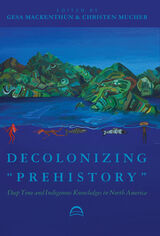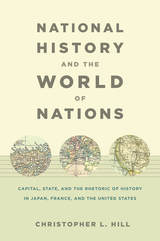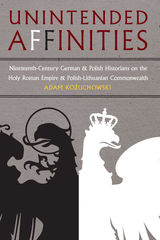
Constructions of America’s ancient past—or the invention of American “prehistory”—occur in national and international political frameworks, which are characterized by struggles over racial and ethnic identities, access to resources and environmental stewardship, the commodification of culture for touristic purposes, and the exploitation of Indigenous knowledges and histories by industries ranging from education to film and fashion. The past’s ongoing appeal reveals the relevance of these narratives to current-day concerns about individual and collective identities and pursuits of sovereignty and self-determination, as well as to questions of the origin—and destiny—of humanity. Decolonizing “Prehistory” critically examines and challenges the paradoxical role that modern scholarship plays in adding legitimacy to, but also delegitimizing, contemporary colonialist practices.
Contributors: Rick Budhwa, Keith Thor Carlson, Kirsten Matoy Carlson, Jessica Christie, Philip J. Deloria, Melissa Gniadek, Annette Kolodny, Gesa Mackenthun, Christen Mucher, Naxaxalhts’i (aka Sonny McHalsie), Jeff Oliver, Mathieu Picas, Daniel Lord Smail, Coll Thrush

Making History Matter explores the role history and historians played in imperial Japan’s nation and empire building from the 1890s to the 1930s. As ideological architects of this process, leading historians wrote and rewrote narratives that justified the expanding realm. Learning from their Prussian counterparts, they highlighted their empiricist methodology and their scholarly standpoint, to authenticate their perspective and to distinguish themselves from competing discourses. Simultaneously, historians affirmed imperial myths that helped bolster statist authoritarianism domestically and aggressive expansionism abroad. In so doing, they aligned politically with illiberal national leaders who provided funding and other support necessary to nurture the modern discipline of history. By the 1930s, the field was thriving and historians were crucial actors in nationwide commemorations and historical enterprises.
Through a close reading of vast, multilingual sources, with a focus on Kuroita Katsumi, Yoshikawa argues that scholarship and politics were inseparable as Japan’s historical profession developed. In the process of making history matter, historians constructed a national past to counter growing interwar liberalism. This outlook—which continues as the historical perspective that the Liberal Democratic Party leadership embraces—ultimately justified the Japanese aggressions during the Asia-Pacific Wars.

Delving into narrative histories, prose fiction, and social philosophy, Hill analyzes the rhetoric, narrative form, and intellectual genealogy of late-nineteenth-century texts that contributed to the creation of national history in each of the three countries. He discusses the global political economy of the era, the positions of the three countries in it, and the reasons that arguments about history loomed large in debates on political, economic, and social problems. Examining how the writing of national histories in the three countries addressed political transformations and the place of the nation in the world, Hill illuminates the ideological labor national history performed. Its production not only naturalized the division of the world by systems of states and markets, but also asserted the inevitability of the nationalization of human community; displaced dissent to pre-modern, pre-national pasts; and presented the subject’s acceptance of a national identity as an unavoidable part of the passage from youth to adulthood.

READERS
Browse our collection.
PUBLISHERS
See BiblioVault's publisher services.
STUDENT SERVICES
Files for college accessibility offices.
UChicago Accessibility Resources
home | accessibility | search | about | contact us
BiblioVault ® 2001 - 2024
The University of Chicago Press









